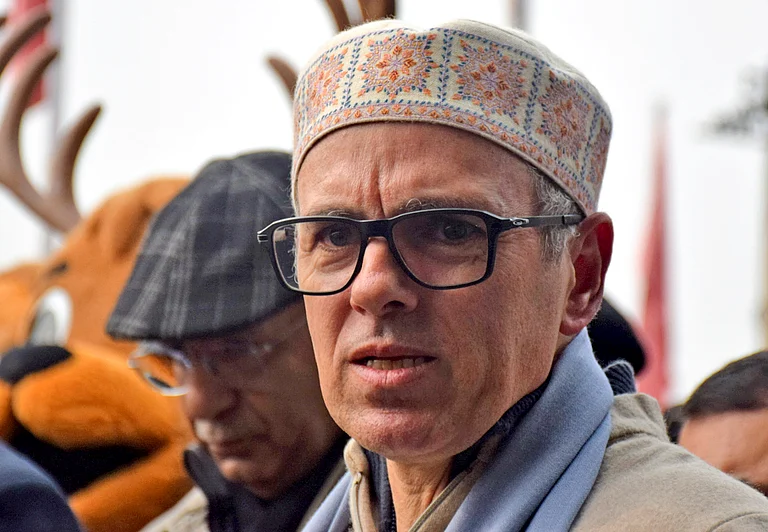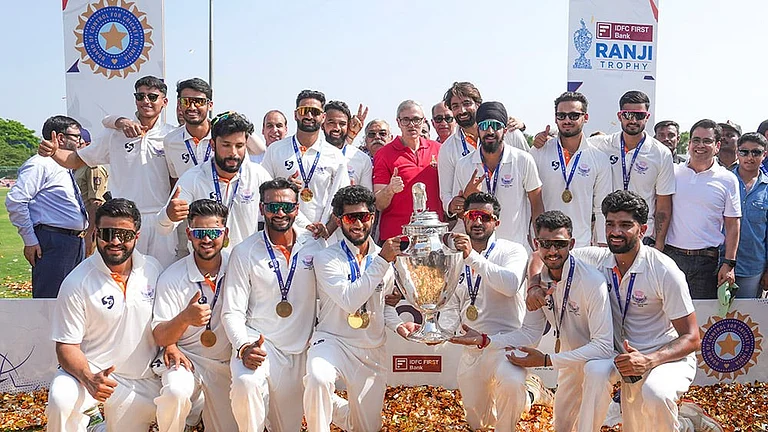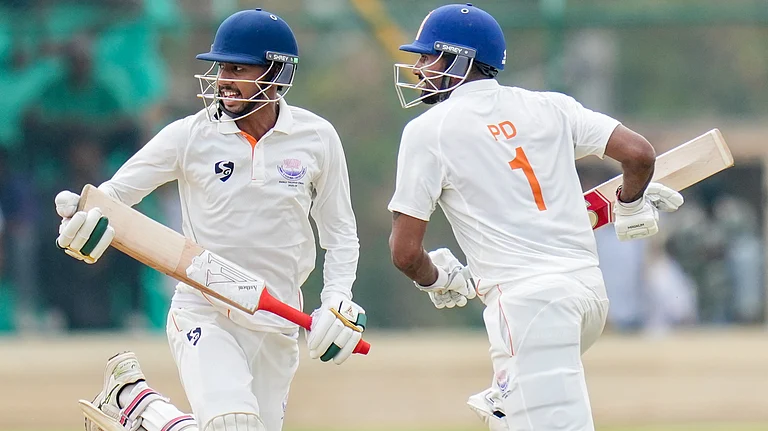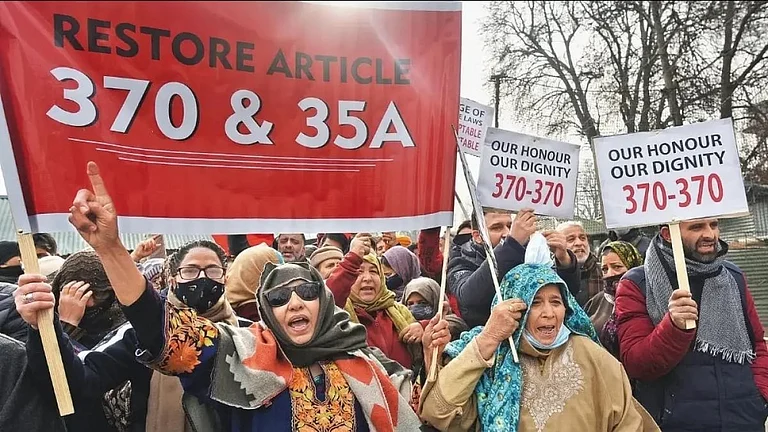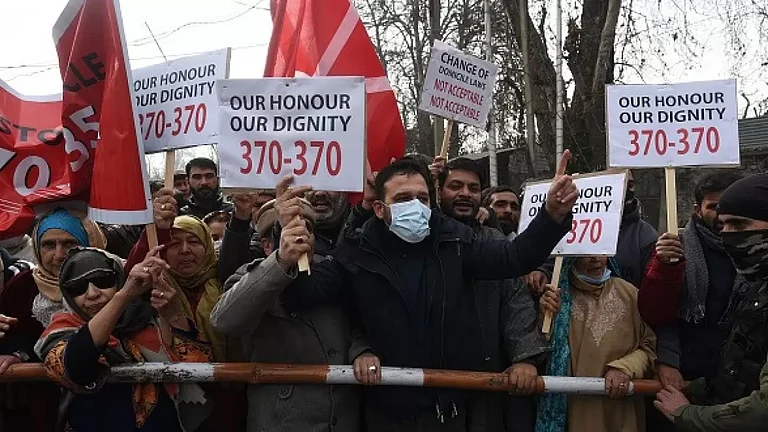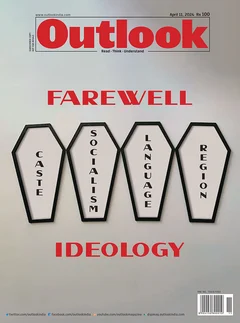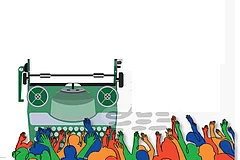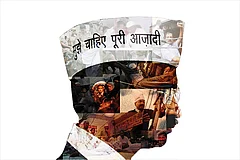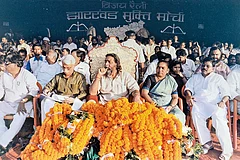Conventionally, a tarami holds centre-stage at an elaborate wazwan feast. It’s a big, shiny copper dish heaped with fragrant rice, topped with spinach cooked in spices, Kashmiri seekh kebab and lamb in plum sauce.
Ritualistically speaking, yes, it was the tarami that was the object of focus recently at the Nawai Subh, National Conference (NC) party’s headquarters near Srinagar’s Zero Bridge, the venue for former chief minister Omar Abdullah’s rare, but sumptuous wazwan feast for local journalists.
But at this particular wazwan, what also shared the limelight apart from the tarami, were signs of a resurgence of political discourse in Jammu and Kashmir, which had faded into the backdrop ever since the abrogation of Article 370 in 2019.
After serving journalists in attendance, Abdullah elaborated on his party’s stance ahead of the General Elections, particularly the Rajouri-Anantnag seat. He highlighted the Congress party’s reluctance to allocate it to the People’s Democratic Party (PDP) as part of the INDIA alliance’s seat-sharing in J&K. Abdullah, however, expressed confidence in winning the polls and reiterated the government’s hesitance to hold Assembly Elections.

Now, let’s rewind to October 2004, when a 16-member delegation of the South Asian Free Media Association (SAFMA), comprising journalists and activists, visited J&K as part of a government-guided trip. The visit was aimed at fostering understanding and confidence-building measures. The then Chief Minister Mufti Mohammad Sayeed, NC leader Abdullah and Kashmiri separatists hosted the delegation. Abdullah addressed the delegation at the Nawai Subh, explaining his party’s stance on autonomy and taking questions from journalists, while reiterating that internal autonomy is the solution to the Kashmir issue. Additionally, he hosted the Pakistani guests to a wazwan feast.
Much water has flowed down the Jhelum since the cross-border bonhomie of 2004. On August 5, 2019, Abdullah, along with hundreds of others, was arrested as the government abrogated Article 370, which gave Kashmir special status within the Indian Union. One of the accusations against Abdullah in his Public Safety Act (PSA) dossier was that he was motivating people to vote.
In March 2020, when Abdullah was released from jail, the invariably clean shaven politician with a strong jaw appeared transformed, sporting a long, white flowing beard after a prolonged spell in captivity. “232 days after my detention today, I finally left Hari Niwas. It’s a very different world today from the one that existed on 5th August 2019,” he said. A few minutes later, he tweeted again. “Had lunch with my mum & dad for the first time in almost 8 months. I can’t remember a better meal even though I’ve been in a bit of a daze & don’t remember what I ate,” reads another tweet from that day.
Only time will tell whether the NC has closed all its doors to the BJP, or if there’s a possibility of a crack in the door, as Abdullah has hinted.
Lately, Nawai Subh is buzzing again. The National Conference leaders, including vice president Abdullah and president Dr Farooq Abdullah, are regularly spotted at their party headquarters, signalling the NC’s resurgence post the setback of abrogation and the detention of its leaders.
Just three years ago, only spokesperson Imran Nabi Dar occupied the desolate party headquarters, grappling with uncertainties about Kashmir’s future. When asked about security forces’ undergarments draped over party flags in the vicinity at the time, he had attributed it to prevailing conditions. However, circumstances have evolved since then.
While the party’s flags and festoons have regained their identity, political slogans like autonomy, the PDP’s bellowing for self-rule and Azadi slogans raised by separatists appear to have vanished from Kashmir’s political landscape.
Political parties are eager to reclaim their positions in J&K, where assembly elections have not been held since 2014. They are urging the Election Commission to conduct the elections, even as the BJP consistently continues to taunt its opponents, the NC and the PDP, about their twin ideological slogans of autonomy and self-rule. Union Minister Jitendra Singh recently went one step further, when he repeatedly emphasised that J&K had achieved “true” self-rule and autonomy under the Modi government and contrasted his claim with what he considers the “frivolous slogans” of demands raised by Kashmir-centric political parties.
“The empowerment of women in Jammu & Kashmir has been greatly inspired by the leadership of PM Shri Narendra Modi. Under his guidance, efforts have also been made to enhance the political representation of Scheduled Tribes, a subject worthy of research. Those who previously debated autonomy and self-rule but failed to establish grassroots governance structures like Gram Panchayats and Zila Parishads,” Singh said, after former NC leader Dr Shehnaz Ganai joined the party recently.
On December 11, 2023, the Supreme Court upheld the abrogation of Article 370 as “constitutionally valid,” providing only consolation to the petitioners, mostly regional political parties, who sought a directive from the ECI to hold elections in Jammu and Kashmir by September 2024.
The NC’s political ideology has centred around Article 370, making its battle both legal and political. Despite earlier rulings declaring Article 370 permanent, the recent Supreme Court judgement upheld its abrogation. Abdullah believes another bench might reverse this decision. Just as the BJP persisted in its fight to revoke Article 370, the NC vows to continue its struggle to restore it.
Originating as a Muslim conference in 1931, the NC transformed into an inclusive ideological party dedicated to Indian unity and social reform, significantly influencing Jammu and Kashmir’s political landscape in 1947-1948. Party founder Sheikh Abdullah’s visionary ‘Naya Kashmir’ document was considered revolutionary, advocating for progressive reforms and women’s rights in Kashmir when it was unheard of in other regions.
Under Sheikh Abdullah’s leadership, the NC advocated for autonomy within the Indian Union, aligning with principles of Indian unity and regional autonomy. Despite facing significant challenges and casualties among its members, the NC has persisted as a prominent political entity in Jammu and Kashmir. Following the abrogation of Article 370 and the decline of the PDP, the NC has repositioned itself as a formidable force in the region.
As the NC contemplates the resurgence of Sheikh Abdullah’s legacy, it confronts pivotal decisions amid J&K’s evolving political landscape. Will it adhere to its founding principles of autonomy and advocate for Article 370 restoration, or opt for compromise as seen during its alliance with the NDA in 1999? Formerly, Abdullah served as Union Minister of State for External Affairs under the NDA government.
Conflicting signals appear to emerge from the opposition outfit. While Abdullah refuted recent rumours of the NC joining the BJP-led NDA, emphasising his party’s stance against such speculation, his father, Dr Abdullah, stated that “all options are open.”
MORE FROM THIS ISSUE
Only time will tell whether the NC has closed all its doors to the BJP, or if there’s a possibility of a crack in the door, as Dr Abdullah has hinted. At a recent Iftiaar party, NC leaders were seen posing for pictures with Abdullah’s sons, Zamir and Zahir, suggesting they could be the party’s next-generation leaders. However, as the party continues to grapple with finding a post-370 slogan, Farooq Abdullah, the NC president, appears to have found a solution already. “We are fighting this election to save our dignity and identity,” Abdullah proclaims.
(This appeared in the print as 'The Political Aroma Of Wazwan')



